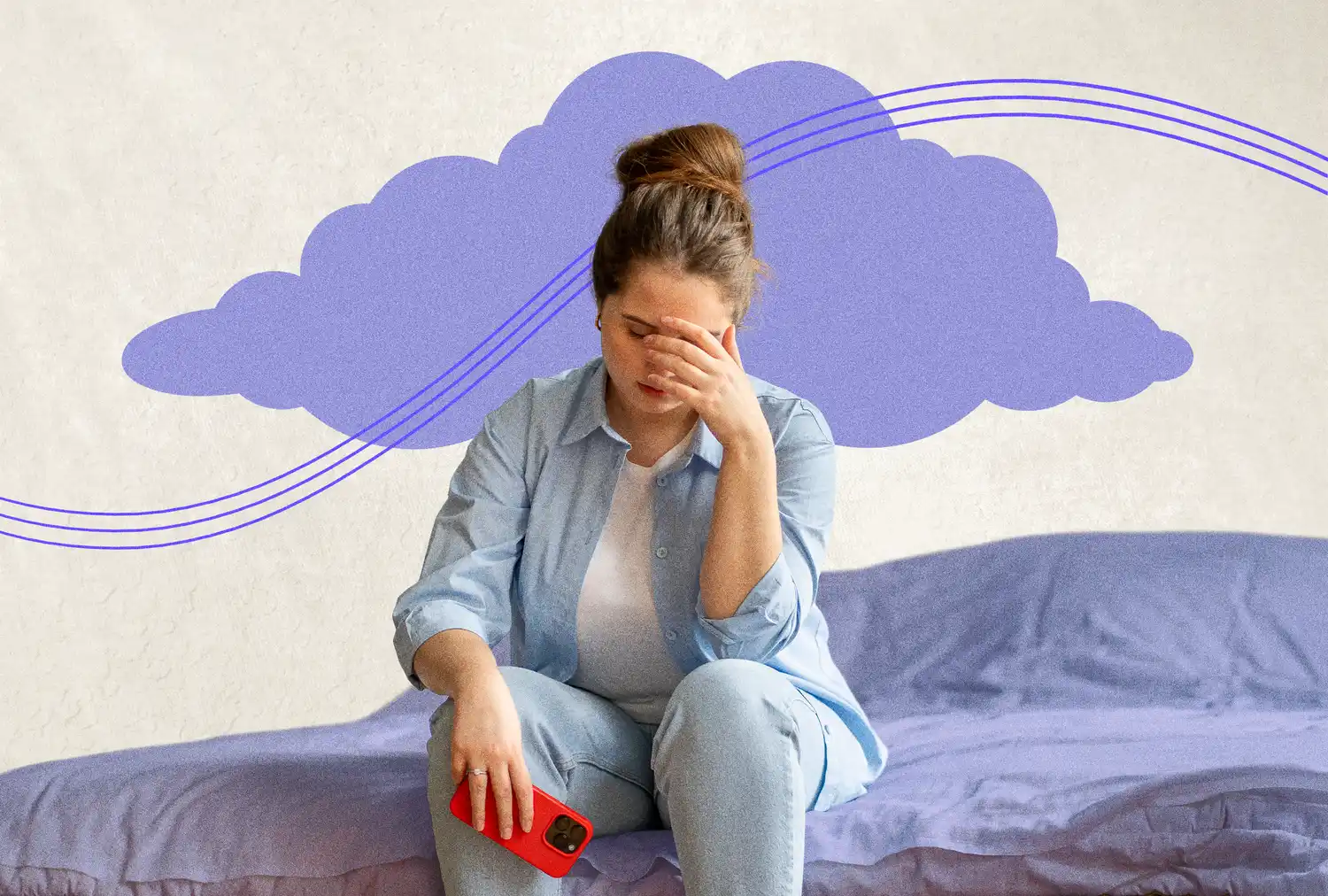The Complete Guide to Revenge Bedtime Procrastination
Revenge bedtime procrastination happens when you deliberately stay up late for "me-time," even though you know you'll be exhausted tomorrow. It's not just a bad habit; it's a quiet protest against days that feel overworked, overscheduled, or controlled by everyone but you. Understanding why it happens is the first step to reclaiming both your evenings and your sleep.
In simple terms, revenge bedtime procrastination is "trading sleep for freedom"—and that trade quickly becomes expensive.
Research Hook: Why We Scroll Instead of Sleep
If you've ever looked up at the clock at 1:47 a.m. and thought, "I know I should sleep, but this is the only time that's mine," you're not alone.
Recent surveys across the U.S. and Europe show a sharp rise in late-night screen use, streaming, and aimless scrolling among people who report low control over their daytime schedules. Harvard researchers (2024) note that chronic "sleep for leisure" trade-offs are strongly linked to burnout, anxiety, and reduced executive function.
At the same time, Stanford researchers highlight a growing pattern in high-pressure workers, caregivers, students, and entrepreneurs: people are aware of the consequences, but still consciously delay sleep to reclaim autonomy.
Revenge bedtime procrastination isn't laziness. It's a psychological signal that your days aren't meeting your emotional, creative, or rest needs.
What Is Revenge Bedtime Procrastination? (Featured Answer)
Revenge bedtime procrastination is when you intentionally delay going to bed—without an external reason like work or illness—to enjoy personal time after a demanding day. You know you're sacrificing sleep and tomorrow's energy, but you stay up anyway to feel free, in control, or "off duty."
Key features:
- Your bedtime is delayed in a way that cuts into your total sleep.
- There's no unavoidable cause (e.g., emergencies, shift work, insomnia).
- You're aware it will hurt tomorrow, yet you still choose it.
The Science of Revenge Bedtime Procrastination
At its core, revenge bedtime procrastination sits at the intersection of self-control, autonomy, and circadian rhythm.
Psychologists describe it as a gap between intention and action: you plan to sleep at a reasonable hour but override that plan in favor of low-effort pleasure or decompression.
Several mechanisms drive this behavior:
- Autonomy deprivation: When days are packed with obligations, your brain searches for any window to feel in charge.
- Ego depletion: After a long day of decisions and self-control, it's harder to make disciplined choices at night.
- Reward-seeking: Late-night scrolling, shows, or games give a quick dopamine hit, reinforcing the habit.
- Chronotype mismatch: Night owls forced into early starts are especially vulnerable.
When your days feel owned by others, your nights become your rebellion.
Latest Research (Summarized for 2025)
Here’s how current research sharpens our understanding:
Bedtime Procrastination & Self-Regulation (2014) Found that people who delay sleep despite intending to rest show lower self-regulation, suggesting a willpower–behavior gap rather than simple preference.
Chronotype and Self-Control Interaction (2018)
Showed bedtime procrastination is more frequent when natural sleep patterns clash with social or work demands, especially in evening types.Gender, Students, and High-Demand Roles (2019)
Reported higher bedtime procrastination among women and students, aligning with heavy emotional labor, academic stress, and constrained daytime freedom.Pandemic-Era Sleep Disturbances (2021 Meta-Analysis)
Identified increased sleep problems and blurred boundaries between work and home, which amplified late-night reclaiming behaviors.Recent Clinical Insights (Harvard, 2024)
Highlight that chronic sleep restriction linked to revenge bedtime procrastination is associated with increased burnout, emotional reactivity, and impaired decision-making.
Together, these findings confirm: this is not a quirky trend. It's a response to structural pressure, stress, and unmet psychological needs.
People Also Ask: Is Staying Up Late Always Revenge Bedtime Procrastination?
Not always. Staying up late only counts as revenge bedtime procrastination when:
- You could go to bed, but choose not to for leisure or "me-time."
- You know it's harming your sleep and next day.
- You're not kept up by insomnia, night shifts, childcare emergencies, or illness.
If you're desperately trying to sleep and can't, that's likely a sleep disorder or anxiety—not procrastination.
Who Is Most Affected (and Why It Feels Like Revenge)
Revenge bedtime procrastination appears often in people who feel that their day is "not their own."
Common groups:
- Parents and caregivers: Evenings become the only quiet space to think, scroll, or sit in silence.
- High-pressure professionals: Long hours, constant availability, and digital notifications push leisure to midnight.
- Students: Academic load, part-time jobs, and social expectations encourage "I'll rest later" cycles.
- Gig workers and entrepreneurs: Blurred boundaries make it hard to switch off.
Newer patterns (2023–2025):
- Remote workers who never fully "log off."
- Creators and side-hustlers who work by day and build brands by night.
- People in shared housing who only get privacy after everyone else sleeps.
The "revenge" is symbolic: you’re stealing back time from a schedule that stole it first.
People Also Ask: Why Do I Sabotage My Own Sleep?
You’re not trying to hurt yourself; you’re trying to feel human.
Three evidence-based explanations:
- Psychological reactance: When life feels controlled, you resist rules—even your own bedtime.
- Emotional compensation: Late-night leisure compensates for unmet needs for joy, rest, or play.
- Exhausted self-control: By night, your brain is less able to choose the long-term benefit (sleep) over short-term comfort.
Recognizing this can shift your mindset from shame to strategy.
Evidence-Based Mechanisms Behind the Habit
Researchers point to several intertwined mechanisms:
- Depleted self-control: After a demanding day, the mental "muscle" that supports discipline is tired, making it easier to keep tapping "next episode."
- Instant reward vs. delayed reward: Streaming, scrolling, or casual games offer immediate pleasure; quality sleep is a delayed payoff.
- Circadian influences: Night owls naturally get a second wind, which, combined with device use, makes disengaging harder.
- Cognitive distortions: "I deserve this," "Just one more," or "I'll fix my sleep this weekend" reinforce the cycle.
The problem isn’t wanting downtime. It’s paying for it with the one resource your brain cannot afford to lose: sleep.
Impact: What Happens When It Becomes a Habit?
Occasional late nights are normal. But consistent revenge bedtime procrastination can push you into chronic sleep debt.
Research has linked ongoing sleep loss to:
- Higher anxiety and low mood
- Greater risk of depression
- Reduced concentration and slower thinking
- Higher blood pressure and cardiovascular risk
- Weakened immune response
- Increased appetite and weight gain
- Memory and learning difficulties
Harvard (2024) and other large-scale reviews emphasize that even losing 60–90 minutes of sleep most nights can impair performance and emotional regulation, even if you "feel fine."
People Also Ask: Is Revenge Bedtime Procrastination Really That Bad?
Short answer: yes, if it's chronic.
In 40–50 words: Regularly trading sleep for late-night freedom compounds into fatigue, stress, irritability, and health risks. Over time, it can lower productivity, strain relationships, and worsen mental health—even if your nightly delay seems small.
Meta-Analysis Insights: What the Data Suggests
Across multiple reviews of sleep research:
- Sleep duration matters: Even modest, chronic restriction is linked to mood and metabolic changes.
- Consistency counts: Irregular bedtimes disrupt circadian rhythm, amplifying fatigue.
- Behavior is modifiable: Structured changes in routine, environment, and cognitive patterns reliably improve sleep.
Emerging conclusions:
- Tackling revenge bedtime procrastination works best when you address both sleep hygiene and daytime autonomy.
- Shaming yourself for it backfires; skills-based and environment-based changes are more effective.
Research-Backed Strategies to Stop Revenge Bedtime Procrastination
These strategies are designed for real life—especially if you feel overbooked, exhausted, and "on" for everyone else.
1. Prioritize Sleep Without Losing Your Me-Time
- Decide your non-negotiable sleep window (e.g., 11 p.m.–7 a.m.).
- Protect 20–45 minutes of guilt-free personal time earlier in the evening.
- Treat sleep as a performance tool, not a luxury: better sleep=better focus, patience, and creativity tomorrow.
2. Reshape Your Evenings (Featured Checklist)
In 40–50 words: Build a predictable, gentle wind-down routine 60–90 minutes before bed. Dim lights, disconnect from intense work, and choose calming activities. This helps your brain switch from "urgency" to "safety," reducing the urge to reclaim time at midnight.
Try:
- A warm shower or skincare ritual
- Light stretching or breathing exercises
- A comforting drink (non-caffeinated)
- Journaling three small wins from the day
3. Turn Autopilot Habits Into Intentional Choices
Instead of vague rules like "sleep earlier," use precise, easy steps:
- Set a "last screen" alarm 45–60 minutes before bed.
- Disable autoplay and notifications on streaming apps.
- Charge your phone away from your bed.
- Pre-decide: "Two episodes max" or "10 minutes of scroll, then off."
These micro-commitments reduce decision fatigue when your willpower is low.
4. Fix the Daytime Problem (The Real Root)
If your entire day is pressure and obligation, your brain will keep demanding revenge at night.
Audit your day:
- Identify 1–2 tasks you can delegate, drop, or batch.
- Build in a 10–15 minute daytime micro-break with no productivity (walk, music, sun, silence).
- If possible, align tough tasks with your peak energy time, not late evening.
The more respected you feel during the day, the less you need to rebel at night.
5. Use Implementation Intentions
Implementation intentions are simple "if-then" plans backed by behavioral research.
Examples:
- "If it's 10:15 p.m., then I close all tabs and start my wind-down routine."
- "If I think 'just one more episode,' then I stand up, turn off the TV, and brush my teeth."
This moves you from emotional negotiation to automatic action.
6. Make Sleep Easier to Choose
Optimize your environment so sleep feels inviting:
- Keep your bedroom cool, dark, and quiet.
- Use soft, indirect lighting after sunset.
- Reserve your bed for sleep and intimacy, not email.
- Keep relaxing items nearby: a book, eye mask, or journal.
When bed equals calm, it's easier to choose it over scrolling.
7. Address Underlying Stress and Mental Health
If revenge bedtime procrastination is fueled by dread of tomorrow, loneliness, or anxiety, address the root:
- Try brief nightly check-ins: "What am I avoiding by not sleeping?"
- Use simple tools: breathing exercises, worry lists, or next-day planning.
- If you notice persistent anxiety, low mood, or insomnia, consider speaking with a licensed professional.
People Also Ask: How Do I Break Revenge Bedtime Procrastination in 7 Days?
Use a focused, realistic reset. In 40–50 words: For one week, choose a consistent bedtime, plan a short nightly ritual, set a tech cutoff, and schedule at least one pocket of me-time during the day. Track how you feel each morning. Small wins build motivation and make the new pattern stick.
A simple 7-day structure:
- Choose a bedtime you can actually keep.
- Set a daily tech-off time 45 minutes before bed.
- Protect 15–30 minutes of earlier-evening me-time.
- Repeat the same 2–3 calming pre-sleep actions.
- Notice morning benefits (energy, mood, clarity).
- Adjust gently, not perfectly—aim for progress.
- Celebrate adherence, not perfection.
Practical Real-Life Examples
- A healthcare worker moves her "doomscrolling" from midnight to a scheduled 9:30 p.m. 15-minute catch-up, then reads fiction in bed.
- A parent negotiates with their partner for 20 minutes of solo time right after the kids sleep, instead of at 12:30 a.m.
- A startup founder time-blocks deep work earlier and sets a public "offline" status at 10 p.m. to reduce late-night Slack pressure.
These changes are small, but they transform nights from rebellion into restoration.
Expert Recommendations (Routinova Perspective)
Routinova-aligned, science-based guidance:
- Protect sleep as a non-negotiable baseline habit—like hydration or breathing.
- Design micro-moments of autonomy in your day so freedom isn’t exiled to 1 a.m.
- Use clear cues and limits (alarms, routines, screen rules) instead of relying on willpower alone.
- Reflect monthly: "Does my schedule reflect my values, or am I only living after midnight?"
Revenge bedtime procrastination is not a moral failure. It’s feedback. When you honor that signal—by reshaping your days and evenings—you don’t have to choose between being well-rested and feeling like your life belongs to you.












